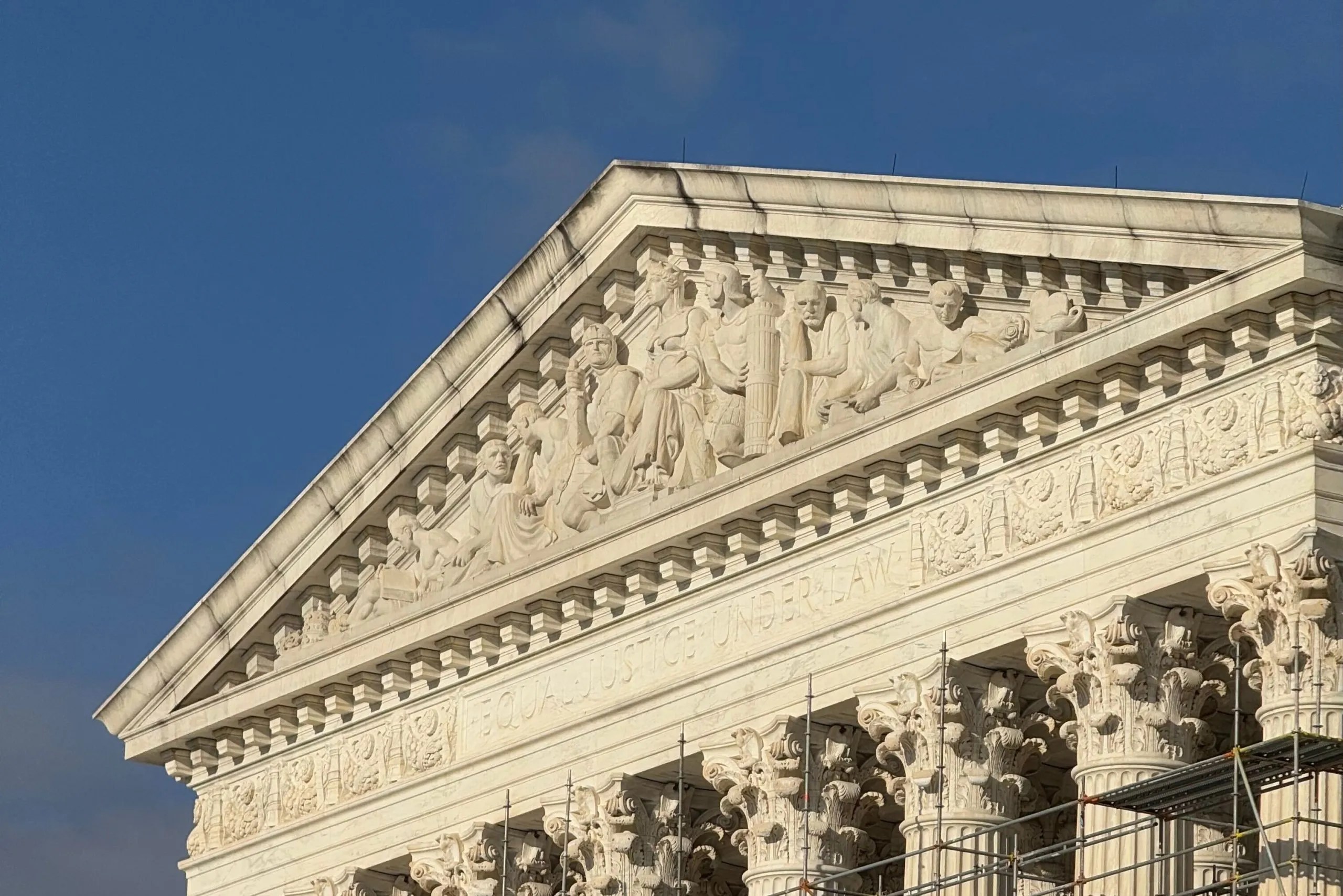SCOTUStoday for Tuesday, November 25


On Nov. 25, 2020, in a late-night order issued hours before Thanksgiving began that year, the court blocked enforcement of New York’s attendance restrictions for houses of worship during the COVID-19 pandemic.
Reminder: Tomorrow, we’ll be sending an abridged version of the newsletter, and then we won’t send SCOTUStoday on Thursday or Friday.
SCOTUS Quick Hits
- On Monday, the Supreme Court released an order list announcing decisions made at the justices’ Friday conference. It showed that the court has not yet acted on the challenges to President Donald Trump’s executive order on birthright citizenship. For more on the significance of this update, see the On Site section below.
- The order list also noted that the court had summarily reversed lower court decisions on the Sixth Amendment’s confrontation clause and rules for post-conviction relief.
- On Friday, Texas asked the Supreme Court to clear the way for it to use a new congressional map intended to increase the chances that Republicans retain control of the U.S. House of Representatives next year. Justice Samuel Alito – who fields emergency requests from the 5th Circuit, which includes Texas – granted an administrative stay on Friday night. In Monday filings, the challengers urged the court to reinstate a ruling by a three-judge district court that barred Texas from using the map.
- The Supreme Court Building will be closed on Thursday and Friday this week.
- Mark your calendars: SCOTUSblog will be hosting a live blog during the oral argument in Trump v. Slaughter on Monday, Dec. 8. The live blog will begin at 9:30 a.m. EST.
Morning Reads
- Trump administration calls on highest court to say yes to Texas’ 2025 congressional map (Faith Bugenhagen, Houston Chronicle) — In a friend-of-the-court brief filed on Monday, the Trump administration called on “the court to reverse a lower court decision blocking the recently approved” congressional map in Texas, according to the Houston Chronicle. Among other topics, the brief addressed a letter sent by the Department of Justice to Texas leaders that outlined race-based concerns about the state’s previous map. The letter was cited by U.S. District Judge Jeffrey Brown in his decision stating that the new map was the result of an unconstitutional racial gerrymander and could not be used in the 2026 elections. “In the DOJ’s Monday brief, officials now argue that Texas lawmakers did not redistrict because of the initial letter.”
- More Americans are being put to death (The Economist)(Paywall) — Forty-four prisoners have been executed so far this year, and by the end of December, that number is expected to be 47. That’s “nearly double last year’s tally and the highest in nearly two decades,” according to The Economist. So what explains the execution surge? The Economist contends that one answer is the Supreme Court. “A decade ago the court would routinely block states from executing people without solid evidence or in torturous ways, forcing judges to make life-or-death decisions in the eleventh hour. In 2019 a more conservative-leaning bench appointed by Mr Trump changed course. … Bryan Stevenson, who runs the Equal Justice Initiative in Alabama, reckons that the court’s retreat from policing the death penalty has emboldened states to pursue executions they once wouldn’t have and to be more ‘experimental’ in how they kill.”
- Trump says tariff revenue poised to ‘skyrocket,’ urges quick decision in Supreme Court case (Tom Howell Jr., The Washington Times)(Paywall) — President Donald Trump on Monday said in a social media post that he’s looking forward to the Supreme Court’s decision on his signature tariffs, which he described as an “urgent and time sensitive matter,” according to The Washington Times. He also wrote that tariff payments will soon “SKYROCKET.” “These payments will be RECORD SETTING, and put our Nation on a new and unprecedented course,” the president wrote.
- Lutnick expects Supreme Court to side with Trump on tariffs, opening door to $2K payouts (Amanda Macias, Fox News) — Commerce Secretary Howard Lutnick also addressed the tariffs dispute on Monday, telling Fox News that the administration is “gonna win the case, it’s pretty clear.” He reiterated the president’s promise to issue a $2,000 tariff dividend to low- and middle-income Americans. “One of the ways to prove to the American people how great tariffs are is to have them share in a part of one year’s income from these tariffs and that’s $2,000 a head for people who need the money,” Lutnick said.
- US Supreme Court declines bid to revive UBS whistleblower’s jury award (Daniel Wiessner, Reuters) — The Supreme Court has declined “to hear a bid by a former UBS bond strategist to revive a $2.6 million jury award in his lawsuit accusing the Swiss bank of unlawfully firing him for refusing to publish misleading research reports,” according to Reuters. “The Supreme Court had already issued one ruling in the case. The justices in 2024 reinstated the jury award after it was previously overturned by a lower court, deciding that financial whistleblowers only have to prove unequal treatment, and not that their employers had a retaliatory motive, to prevail in retaliation lawsuits.” After reviewing the case in light of the 2024 decision, the U.S. Court of Appeals for the 2nd Circuit “again threw out the award, finding that flawed jury instructions in the trial made it too easy to conclude” that the whistleblower was mistreated. By declining to hear the case, the justices left that 2nd Circuit ruling in place.
A Closer Look: The Supreme Court and Thanksgiving
The Supreme Court, as you might imagine, has never had cause to directly weigh in on Thanksgiving celebrations. It’s never settled when the feast should be served (noon, obviously), which side dish is best (mashed potatoes!), or how many different types of pies should be on hand (as many as possible).
The court has, however, debated the holiday’s religious significance. Amid the justices considerations of whether nativity scenes in the town square, Ten Commandments displays, and other public expressions of faith represented an unlawful government endorsement of religion under the First Amendment’s establishment clause, they’ve sparred over how to interpret the Founding Fathers’ relationship to Thanksgiving and what it means for the country today.
In these establishment clause cases, Thanksgiving has been used primarily as an example of acceptable entanglement between church and state. For example, in Zorach v. Clauson, a 1952 case on whether New York City could allow religious kids in public schools to miss part of the school day for religious instruction, Justice William O. Douglas wrote for a 6-3 majority that Thanksgiving’s status as an official holiday – despite its presumably religious nature – shows that church-state separation does not have to be absolute to satisfy the First Amendment (and thus, that New York City’s school-release program was acceptable).
About 30 years later, in 1984’s Lynch v. Donnelly, Chief Justice Warren Burger made a similar point as he explained why it’s acceptable for a city to erect a nativity scene, or creche, along with a Santa Claus house and other Christmas displays, in its shopping district each winter. “Our history is replete with official references to the value and invocation of Divine guidance in deliberations and pronouncements of the Founding Fathers and contemporary leaders. Beginning in the early colonial period long before Independence, a day of Thanksgiving was celebrated as a religious holiday to give thanks for the bounties of Nature as gifts from God. President Washington and his successor proclaimed Thanksgiving, with all its religious overtones, a day of national celebration and Congress made it a National Holiday more than a century ago,” he wrote.
That 1984 case, however, also included an example of how Thanksgiving has been deployed over the years by justices who were taking the opposite position. In his dissenting opinion, Justice William Brennan drew a distinction between Thanksgiving, which has religious roots but over the years has become “unquestionably secular and patriotic,” and a creche, which, in his view, is inextricably tied to Christianity and communicates a “distinctively sectarian message.”
And in cases on a prayer at a middle school graduation ceremony and Ten Commandments displays in courthouses and schools, Justice David Souter used Thanksgiving to show that sorting out the meaning of the establishment clause is complicated and that it has been from the beginning. As Souter pointed out, while President George Washington offered prayers of thanksgiving, President Thomas Jefferson refused to do the same because of establishment clause concerns. “What the evidence does show is a group of statesmen, like others before and after them, who proposed a guarantee with contours not wholly worked out, leaving the Establishment Clause with edges still to be determined. And none the worse for that,” the justice wrote in 2005’s McCreary County v. ACLU of Kentucky.
SCOTUS Quote
“To put it plainly, courts ‘call balls and strikes’; they don’t get a turn at bat.”
On Site
From Amy Howe
Court Does Not Act on Birthright Citizenship — for Now
The Supreme Court did not act on Monday on the challenges to President Donald Trump’s Jan. 20 executive order seeking to end birthright citizenship – the guarantee of citizenship to almost everyone born in the United States. The court will likely consider the cases again at their private conference on Friday, Dec. 5; if it does, it could announce as soon as that afternoon whether it has granted review. For more on what’s next for the birthright citizenship petitions, read Amy’s analysis.
Court Issues Opinions on Confrontation Clause, Post-Conviction Relief
The Supreme Court on Monday morning sent the case of a Mississippi man convicted of abusing his daughter back to the state courts for another look. It also reversed, without briefing on the merits or oral argument, a ruling by a federal appeals court in favor of a Maryland man convicted of second-degree murder. The brief, unsigned opinions came as part of the court’s Monday order list. Read Amy’s analysis for key takeaways from these decisions.
Challengers Urge Justices to Strike Texas’ New Congressional Map as Racially Discriminatory
Civil rights groups and Texans challenging the new congressional map adopted by the Texas Legislature in August urged the Supreme Court on Monday to reinstate a ruling by a three-judge district court that barred the state from using the map in the 2026 elections. One challenger, the Mexican American Legislative Caucus, told the justices that “[w]hen a State receives an explicit directive to engage in racial redistricting … and then produces a map that achieves the directive’s racial targets with mathematical precision, the” Constitution’s equal protection clause “is violated. No amount of post-hoc partisan explanation can erase the record of what actually occurred.” Amy offered an overview of the new briefs in her analysis.
Contributor Corner
Conservative Justices Question the Foundation of U.S. Colonial Rule
In a column for SCOTUSblog, Neil Weare reflected on Congress’ “near-unlimited power to govern” Native Americans and people in U.S. territories and the interest some justices have shown in reining it in. “Justices Neil Gorsuch and Clarence Thomas have challenged the constitutional basis for this sweeping plenary power before in the tribal context. But, in a recent dissent from the denial of review in the case of Veneno v. United States, they questioned whether the Constitution grants Congress plenary power over U.S. territories, as well, something no justice has ever said before,” Weare wrote.
Posted in Featured, Newsletters